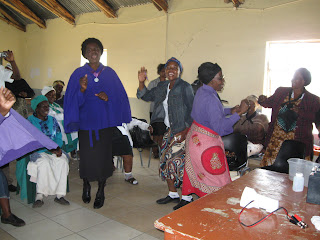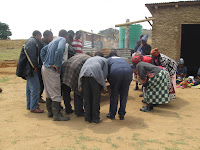Luve Praise by Melody Rockwell
Swaziland Safe Water Project -- sponsored by substantial grants from the Episcopal Church United Thank Offering Gift and Trust Fund and Episcopal Waters of Hope with generous donations from the Iowa Safe Water International Ministries and the Episcopal Diocese of Iowa, parishes and individuals...
 Last Thursday morning (October 15, 2009), the Swaziland Safe Water Ministry team was greeted by a beautiful spring morning for our trip to Luve. We anticipated an abbreviated outing... down the mountain road past Ezulwini, through Manzini and then a short drive north to St. Andrew's Anglican Church. We hoped to be back at the Thokoza Centre in the early afternoon for chlorinator building with time to spare on the way for chlorinator supply shopping in Manzini on the way back. Best laid plans of mice and men and Swazi schedules...
Last Thursday morning (October 15, 2009), the Swaziland Safe Water Ministry team was greeted by a beautiful spring morning for our trip to Luve. We anticipated an abbreviated outing... down the mountain road past Ezulwini, through Manzini and then a short drive north to St. Andrew's Anglican Church. We hoped to be back at the Thokoza Centre in the early afternoon for chlorinator building with time to spare on the way for chlorinator supply shopping in Manzini on the way back. Best laid plans of mice and men and Swazi schedules...
 Last Thursday morning (October 15, 2009), the Swaziland Safe Water Ministry team was greeted by a beautiful spring morning for our trip to Luve. We anticipated an abbreviated outing... down the mountain road past Ezulwini, through Manzini and then a short drive north to St. Andrew's Anglican Church. We hoped to be back at the Thokoza Centre in the early afternoon for chlorinator building with time to spare on the way for chlorinator supply shopping in Manzini on the way back. Best laid plans of mice and men and Swazi schedules...
Last Thursday morning (October 15, 2009), the Swaziland Safe Water Ministry team was greeted by a beautiful spring morning for our trip to Luve. We anticipated an abbreviated outing... down the mountain road past Ezulwini, through Manzini and then a short drive north to St. Andrew's Anglican Church. We hoped to be back at the Thokoza Centre in the early afternoon for chlorinator building with time to spare on the way for chlorinator supply shopping in Manzini on the way back. Best laid plans of mice and men and Swazi schedules...The outer gate was locked when we arrived at St. Andrew's, Luve. The church yard is fenced in to keep out wandering cattle and goats, but there was also no sign of any people gathering for the team's presentation. An elderly woman appeared in the church doorway, then slowly came to open the gate. Inside the church were three elderly women -- one of whom had not come for the chlorinator demonstration, but decided to stay. The parish priest was absent. After a few calls (cell phones are so vital in these rural areas), we found that Rev. Mandla Dlamini was in Manzini making funeral arrangements for his grandmother, who had passed away the previous evening. He said he would come as soon as possible. A call to a nearby community parish nurse, who had indicated there would be a sizable group of people coming from a few kilometers away to the meeting, garnered the report that only one woman was planning to attend. At that point, the team considered cancelling the session. Out of courtesy, we waited for Fr. Dlamini to arrive from Manzini.
Come he did in a swirl of apologies and a suggestion that he go to a Roman Catholic church down the road a ways and see if the women attending the Mother's Union meeting there would be willing to come to the chlorinator demonstration. The chlorinator demonstration session was supposed to start at 10 a.m. and it was nearing noon by this time. Fr. Dlamini called with an affirmative and the team van was enlisted to bring some of the women over with  the rest riding in the back of the priest's pickup. I was sitting in the back of the dimly lighted church... biding my time... waiting when suddenly the air was filled with a Siswati song of praise and women bega
the rest riding in the back of the priest's pickup. I was sitting in the back of the dimly lighted church... biding my time... waiting when suddenly the air was filled with a Siswati song of praise and women bega n marching in, dancing, singing exhuberantly, clapping hands... Anglicans, Lutherans, Zionists, Methodists, Roman Catholics, Evangelicals... It was an awesome beginning... and an energetic session throughout... that lasted until 3 p.m. It was well worth the wait!
n marching in, dancing, singing exhuberantly, clapping hands... Anglicans, Lutherans, Zionists, Methodists, Roman Catholics, Evangelicals... It was an awesome beginning... and an energetic session throughout... that lasted until 3 p.m. It was well worth the wait!
 the rest riding in the back of the priest's pickup. I was sitting in the back of the dimly lighted church... biding my time... waiting when suddenly the air was filled with a Siswati song of praise and women bega
the rest riding in the back of the priest's pickup. I was sitting in the back of the dimly lighted church... biding my time... waiting when suddenly the air was filled with a Siswati song of praise and women bega n marching in, dancing, singing exhuberantly, clapping hands... Anglicans, Lutherans, Zionists, Methodists, Roman Catholics, Evangelicals... It was an awesome beginning... and an energetic session throughout... that lasted until 3 p.m. It was well worth the wait!
n marching in, dancing, singing exhuberantly, clapping hands... Anglicans, Lutherans, Zionists, Methodists, Roman Catholics, Evangelicals... It was an awesome beginning... and an energetic session throughout... that lasted until 3 p.m. It was well worth the wait!















 So far, we have tested six water supplies in rural areas of Swaziland to determine the level of coliform present in the water the people in those communities are drinking. Tests for three of the six had positive indications of the presence of coliform, but none so far have shown the more viral form, E. coliform. Chlorination is especially important in those communities whose water is contaminated with coliform bacteria.
So far, we have tested six water supplies in rural areas of Swaziland to determine the level of coliform present in the water the people in those communities are drinking. Tests for three of the six had positive indications of the presence of coliform, but none so far have shown the more viral form, E. coliform. Chlorination is especially important in those communities whose water is contaminated with coliform bacteria.














 The trainees noted that there was real excitement and interest among the people of Ekupheleni in learning more about the chlorinator. The health maintenance worker, a vigorous and energetic older woman, was particularly vocal about the difference a chlorinator could make f
The trainees noted that there was real excitement and interest among the people of Ekupheleni in learning more about the chlorinator. The health maintenance worker, a vigorous and energetic older woman, was particularly vocal about the difference a chlorinator could make f


